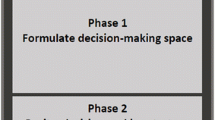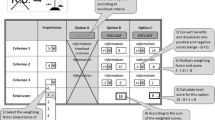Abstract
In this study the effects of different learning environments on the promotion of decision-making competence for the socioscientific issue of genetically modified crops is investigated. The comparison focuses on direct vs. indirect instructions. Therefore on the one hand a sophisticated decision-making strategy was presented to the directly instructed experimental group (1) and had to be applied correctly. On the other hand indirectly instructed students had to invent an appropriate strategy by themselves (2) based on the given information and the structure of the problem context. Group discussions are analysed qualitatively in order (1) to outline how the given strategy was understood and its results were reflected on by the students and (2) to explore the characteristics of invented strategies and their degree of complexity. Results indicate that the direct instruction of complex decision-making strategies may lead to a lack of understanding of the decision process when the given strategy is applied and therefore may cause rejection of the final decision. Indirectly instructed students were able to invent sophisticated decision-making strategies containing compensatory trade-offs. It is concluded that when directly instructing complex decision-making strategies, essential parts of reflection have to be integrated in order to gain greater transparency. Accordingly, empirical evidence has been found to consider indirect instruction as a possible way to foster decision-making strategies for complex socioscientific issues even if compensatory procedures are considered to be necessary.

Similar content being viewed by others
References
American Association for the Advancement of Science. (1989). Science for all Americans. Project 2061. New York: Oxford University Press.
Anderson, T., Howe, C., Soden, R., Halliday, J., & Low, J. (2001). Peer interaction and the learning of critical thinking skills in further education students. Instructional Science, 29, 1–32.
Betsch, T., & Haberstroh, S. (2005). Current research on routine decision-making: Advances and prospects. In T. Betsch & S. Haberstroh (Eds.), The routines of decision-making. Mahwah: Lawrence Erlbaum Associates.
BMELV - Federal Ministry of Food, Agriculture and Consumer Protection (2010). Aigner prohibits cultivation of MON810, pressrelease 063, http://www.bmelv.de/cln_154/SharedDocs/ Pressemitteilungen/EN/063-MON810.html, 16.12.2010.
Bögeholz, S. (2001). Explizite Bewertung: Ein Ansatz zur Förderung ökologischer Urteilskompetenz im Unterricht. In H. Bayrhuber, U. Harms, R. Hedewig, C. Hößle, S. Klautke, R. Klee, A. Kroß, J. Mayer, H. Prechtl, J. Schletter & K. Schlüter. (Eds.), Biowissenschaften in Schule und Öffentlichkeit. Jubiläumstagung zum 25jährigen Bestehen der Sektion Biologiedidaktik im Verband Deutscher Biologen (vdbiol).
Bögeholz, S. (2006). Explizites Bewerten und Urteilen. Praxis der Naturwissenschaften – Biologie, 1(55), 17–24.
Bögeholz, S., & Barkmann, J. (2003). Ökologische Bewertungskompetenz für reale Entscheidungssituationen: Gestalten bei faktischer und ethischer Komplexität. In DGU-Nachrichten, H. 27.
Bögeholz, S., & Barkmann, J. (2005). Rational choice and beyond: Handlungsorientierende Kompetenzen für den Umgang mit faktischer und ethischer Komplexität. In R. Klee, A. Sandmann, & H. Vogt (Eds.), Lehr- und Lernforschung in der Biologiedidaktik. Innsbruck: StudienVerlag.
Cubitt, R. (1995). Review – the adaptive decision maker. The Economic Journal, 105(428), 235–237.
Dean, D., & Kuhn, D. (2007). Direct instruction vs. discovery: the long view. Science Education, 91, 384–397.
Driver, R., Newton, P., & Osborne, J. (2000). Establishing the norms of scientific argumentation in classroom. Science Education, 84(3), 287–312.
Duschl, R. A., & Osborne, J. (2002). Supporting and promoting argumentation discourse in science education. Studies in Science Education, 38, 39–72.
Eggert, S. (2008). Bewertungskompetenz für den Biologieunterricht - Vom Modell zur empirischen Überprüfung. Dissertation. Georg-August-Universität Göttingen, http://webdoc.sub.gwdg.de/diss/2008/eggert/eggert.pdf, 17.10.2010.
Eggert, S., & Bögeholz, S. (2010). Students’ use of decision making strategies with regard to socioscientific issues - an application of the Rasch partial credit model. Science Education, 94, 230–258.
Eggert, S., & Hößle, C. (2006). Bewertungskompetenz im Biologieunterricht. Praxis der Naturwissenschaften, 1(55), 1–9.
Eisenführ, F., & Weber, M. (2003). Rationales entscheiden. Berlin: Springer.
Früh, W. (2001). Inhaltsanalyse. Konstanz: UVK.
Gagne, R. M. (1984). Learning outcomes and their effects: Useful categories of human performance. American Psychologist, 39, 377–385.
Gaissmaier, W., & Gigerenzer, G. (2006). Wie funktioniert Intuition? In E. H. Witte (Ed.), Evolutionäre Sozialpsychologie und automatische Prozesse. Lengerich: Pabst Science.
Gigerenzer, G. (2008). Rationality for mortals – how people cope with uncertainty. New York: Oxford University Press.
Gijbels, D., et al. (2005). Effects of problem-based learning: a meta-analysis from the angle of assessment. Review of Educational Research, 75(1), 27–61.
Grace, M. (2008). Developing high quality decision-making discussions about biological conservation in a normal classroom setting. International Journal of Science Education, 31(4), 551–570.
Haidt, J. (2001). The emotional dog and its rational tail: a social intuitionist approach to moral judgement. Psychological Review, 108(4), 814–834.
Hmelo-Silver, C. (2004). Problem-based learning: what and how do students learn? Educational Psychology Review, 16(3), 235–266.
Hogan, K. (1999). Thinking aloud together: a test of an intervention to foster students’ collaborative scientific reasoning. Journal of Research in Science Teaching, 36(10), 1085–1109.
Hogarth, R. M. (2005). Deciding analytically or trusting your intuition? The advantages and disadvantages of analytic and intuitive thought. In T. Betsch & S. Haberstroh (Eds.), The routines of decision-making. Mahwah: Lawrence Erlbaum Associates.
Hong, J.-L., & Chang, N. K. (2004). Analysis of Korean high school students’ decision-making process in solving a problem involving biological knowledge. Research in Science Education, 34, 97–111.
Jiménez-Aleixandre, M.-P., & Pereiro-Muňoz, C. (2002). Knowledge producers or knowledge consumers? Argumentation and decision-making about environmental management. International Journal of Science Education, 24(11), 1171–1190.
Jungermann, H., Pfister, H.-R., & Fischer, K. (2005). Die Psychologie der Entscheidung. Heidelberg: Elsevier Spektrum Akademischer Verlag.
Kekulé, A. (2009). Unkalkulierbares Risiko. ZEIT ONLINE, 14.4.2009, http://www.zeit.de/online/2009/10/kekule-genmais, 16.12.2010.
Kirschner, P. A. (2002). Cognitive load theory: implications of cognitive load theory on the design of learning. Learning and Instruction, 12, 1–10.
Kirschner, P., Sweller, J., & Clark, R. (2006). Why minimal guidance during instruction does not work: an analysis of the failure of constructivist discovery, problem-based, experiential, and inquiry-based teaching. Educational Psychologist, 41, 75–86.
Klahr, D., & Nigam, M. (2004). The equivalence of learning paths in early science instruction: effects of direct instruction and discovery learning. Psychological Science, 15, 661–667.
Knippels, M.-C. P. J. (2002). Coping with the abstract and complex nature of genetics in biology education. Utrecht: CD-β.
Kolstø, S. D. (2000). Consensus projects: teaching science for citizenship. International Journal of Science Education, 22(6), 645–664.
Kolstø, S. D. (2001). Scientific literacy for citizenship: tools for dealing with the science dimension of controversial socioscientific issues. Science Education, 85, 291–310.
Kolstø, S. D. (2006). Patterns in students’ argumentation confronted with a risk-focused socio-scientific issue. International Journal of Science Education, 28(14), 1689–1716.
Kortland, K. (1996). Decision-making on science-related issues: The case of garbage in physical science – a problem-posing Approach. In G. Welford, J. Osborne, & P. Scott (Eds.), Research in science education in Europe. London: Routledge.
Kuhn, D. (1991). The skills of argument. Cambridge: Cambridge University Press).
Kuhn, D. (2000). Metacognitive development. Current Directions in Psychological Science, 9(5), 178–181.
Kuhn, D. (2001). How do people know? Psychological Science, 12(1), 1–8.
Kuhn, D. (2005). Education for thinking. Cambridge: Harvard University Press.
Kuhn, D. (2007). Is direct instruction an answer to the right question. Educational Psychologist, 42(2), 109–113.
Kuhn, D., & Dean, D., Jr. (2004). Metacognition: a bridge between cognitive psychology and educational practice. Theory into Practice, 43(4), 268–273.
Kuhn, D., & Dean, D. (2005). Is developing scientific thinking all about learning to control variables? Psychological Science, 16, 866–870.
Kuhn, D., & Pearsall, S. (1998). Relations between metastrategic knowledge and strategic performance. Cognitive Development, 13, 227–247.
Kuhn, D., Shaw, V., & Felton, M. (1997). Effects of dyadic interaction on argumentative reasoning. Cognition and Instruction, 15(3), 287–315.
Mayring, P. (2008). Qualitative Inhaltsanalyse - Grundlagen und Techniken. Weinheim und Basel: Beltz.
Payne, J. W., Bettmann, J. R., & Johnson, E. J. (1993). The adaptive decision maker. Cambridge: Cambridge University Press.
Ratcliffe, M. (1997). Pupil decision-making about socio-scientific issues within the science curriculum. International Journal of Science Education, 19(2), 167–182.
Ratcliffe, M., & Grace, M. (2003). Science education for citizenship. Maidenhead: Open University Press.
Rieskamp, J., & Otto, P. E. (2006). SSL: a theory of how people learn to select strategies. Journal of Experimental Psychology: General, 135(2), 207–236.
Rieskamp, J., Busemeyer, J. R., & Mellers, B. A. (2006). Extending the bounds of rationality: evidence and theories of preferential choice. Journal of Economic Literature, 44, 631–661.
Roberts, L., Wilson, M., & Draney, K. (1997). The SEPUP assessment system: An overview. BEAR Report Series, SA-97-1. Berkeley: University of California.
Sadler, T. D. (2004). Moral and ethical dimensions of socioscientific decision-making as integral components of scientific literacy. The Science Educator, 13, 39–48.
Sadler, T. D., & Donelly, L. A. (2006). Socioscientific argumentation: the effects of content knowledge and morality. International Journal of Science Education, 28(12), 1463–1488.
Sadler, T. D., & Zeidler, D. L. (2004). The morality of socioscientific issues: construal and resolution of genetic engineering dilemmas. Science Education, 88, 4–27.
Sadler, T. D., & Zeidler, D. L. (2005). Patterns of informal reasoning in the context of socioscientific decision-making. Journal of Research in Science Teaching, 42(1), 112–138.
Sadler, T. D., Barab, S. A., & Scott, B. (2007). What do students gain by engaging in socioscientific inquiry? Research in Science Education, 37, 371–391.
Seethaler, S., & Linn, M. (2004). Genetically modified food in perspective: an inquiry-based curriculum to help middle school students make sense of tradeoffs. International Journal of Science Education, 26(14), 2004.
Siegel, M. A. (2006). High school students’ decision making about sustainability. Environmental Education Research, 12(2), 201–215.
Sutherland, L. (2002). Developing problem solving expertise: the impact of instruction in a question analysis strategy. Learning and Instruction, 12, 155–187.
Sweller, J. (1994). Cognitive load theory, learning difficulty and instructional design. Learning and Instruction, 4, 295–312.
Veenman, M. V. J., van Hout-Wolters, B. H. A. M., & Afflerbach, P. (2006). Metacognition and learning: conceptual and methodological considerations. Metacognition Learning, 1, 3–14.
Westenberg, M. R. M., & Koele, P. (1994). Multi-attribute evaluation processes: methodological and conceptual issues. Acta Psychologica, 87, 65–84.
Wilson, M., & Sloane, K. (2000). From principles to practice: an embedded assessment system. Applied Measurement in Education, 13(2), 181–208.
Zeidler, D. L., Walker, K. A., Ackett, W. A., & Simmons, M. L. (2002). Tangled up in views: beliefs in the nature of science and responses to socioscientific dilemmas. Science Education, 86, 343–367.
Zeidler, D. L., Osborne, J., Erduran, S., Simon, S., & Monk, M. (2003). The role of argument discourse about socioscientific issues. In D. L. Zeidler (Ed.), The role of moral reasoning on socioscientific issues and discourse in science education. Dordrecht: Academic Publishers.
Zohar, A., & David, A. B. (2008). Explicit teaching of meta-strategic knowledge in authentic classroom situations. Metacognition Learning, 3, 59–82.
Author information
Authors and Affiliations
Corresponding author
Rights and permissions
About this article
Cite this article
Böttcher, F., Meisert, A. Effects of Direct and Indirect Instruction on Fostering Decision-Making Competence in Socioscientific Issues. Res Sci Educ 43, 479–506 (2013). https://doi.org/10.1007/s11165-011-9271-0
Published:
Issue Date:
DOI: https://doi.org/10.1007/s11165-011-9271-0




